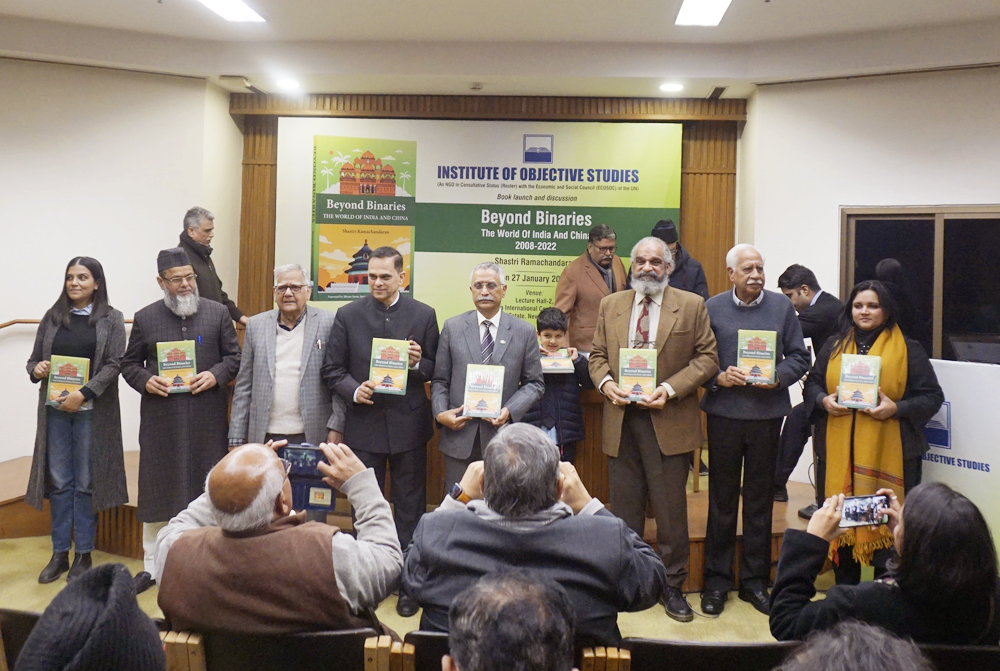IOS book “Beyond Binaries: The World of India and China” by Shastri Ramachandaran released

IOS book “Beyond Binaries: The World of India and China” by Shastri Ramachandaran released
New Delhi: “Beyond Binaries: The World of India and China (2008-2022)”, authored by eminent journalist, Shastri Ramachandaran was released by the former Chief of Army Staff, General M.M. Naravane at an impressive function organised by the Institute of Objective Studies at India International Centre on the evening of January 27, 2024. The book is a compilation of Shastri Ramachandaran’s writings which was written for various Indian, Chinese and International media and institutions during the period 2008-2022.
Releasing the book, Gen. Naravane said that the book was a welcome addition to several other books published earlier on a neighbour which had not been very friendly to India. He observed that sometimes people had a wrong perception about China. As Indians, we have not read the country properly. This is why we have a wrong perception about China. So is the case with our army.
He shared his experience during his posting as a Colonel at the India-China border area. He lived there and worked there, and knows everything about that country. Local people were friendly to him. He worked at the border areas including the disputed Indo-China territories. He held that he had a different perception of the boundary issues of India with China. While dealing with China or other countries, one should see both sides of the spectrum. The book gave a balanced perspective of China. It became worth reading because of the foreword to book written by India’s former foreign secretary, Shyam Saran.
Gen. Naravane said that the phase of “Hindi-Chini Bhai-Bhai” and its aftermath necessitated confidence building measures on the border question. India witnessed Galwan incident and was pushed back to the wall. He referred to the Chinese foreign minister’s recent statement that the border question of China with India was part of its legacy. Where there was trade and commerce, disputes were bound to happen. Similarly, where there was a dispute, there was conflict. Thus the national interest of a country was paramount to determine foreign policy. He further articulated that friendly relationship between the two giants was in the interest of the entire world. At least a Chines expert had called India a giant. China wanted India to recognise China as a big power. He categorically said that confrontation was harmful for both the countries. He remarked that China was bound to lose more if she held recourse to confrontation. Instead of toing the line of a big power, the line of governance should be followed, he concluded.
The message of the IOS Chairman, Dr. Mohammad Manzoor Alam, who could not attend the function due to his indisposition, was read out by the senior journalist, Raju Mansukhani on the occasion. In his brief message, Dr. Alam expressed happiness that the function was being organised to discuss the finer points of the book by an eminent journalist like Shastri Ramachandaran.
Speaking about his book, Shastri Ramachandaran, said he tried to de-code China. As he travelled China, he saw the Chinese society with his own eyes. There were inside stories of that country which were ‘not narrated in India’. As a journalist, he felt that there was a need to do more work on China in order to correctly understand the country because there were many things to explore. It should be studied how China managed its economic imbalance. There was a lot of trade balance between China and USA. China was the third largest economy of the world. Referring to the slowing down of Chinese economy, he said that currently China stuck to the policy of three children norm. Chinese relations with India had past linkages by way of Buddhism and Buddhism paintings. He said that as an optimist, he believed that India and China should show pragmatism and collaborate in several areas.
Presiding over the function, the secretary general of the IOS, Prof. Z.M. Khan observed that the author started with common aspects and then he unfolded big points of development. He talked of two civilizational countries that had great civilisation and culture. Development process of China was very fast. He emphasised cooperation between the two countries. He covered many things during the period under review. As such, the book was very useful for researches and policy makers, he said.
Book release function was followed by the panel discussion, which was participated by – V. Srinivas, Secretary, Government of India and Director General, National Centre for Good Governance; Satrupa Bhattacharjya, journalist who worked in China, India and Sri Lanka; Prof. Arshi Khan, professor of Political Science, Aligarh Muslim University, Aligarh; Jayadeva Ranade, Member, National Security Advisory Board and President, Centre for China Analysis and Strategy; and Rityusha Tiwari, faculty, University of Delhi and associate editor, China Report.
The function ended with assistant secretary general, IOS, Prof. Haseena Hashia, extending a vote of thanks.
Go Back